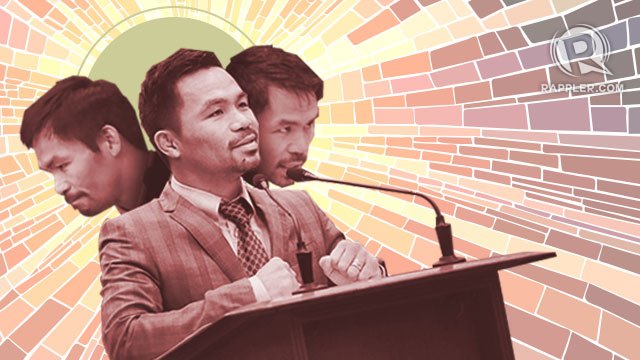

Recounting his conversion story, Pacquiao once claimed that he heard the voice of God. It was a pivotal moment for the man who once lived a hedonistic lifestyle. In his account, the voice of God caused him to tremble and melt, an “amazing, amazing experience”.
How could anyone doubt his conversion?
The man whose marriage almost fell apart became the poster boy of marital renewal. In 2012, Pacquiao captioned his selfie with his wife with a verse from Ephesians: “Husbands, love your wives, even as Christ also loved the church, and gave himself for it.”
Methodists have a term for this transformation: the “warming of the heart”. That it is described as a physical sensation only shows the limits of human language to depict a deep spiritual encounter with a forgiving God.
Pacquiao’s conversion is a narrative of redemption.
It is thus difficult to believe that the same man now wants to reimpose that which arrests the very possibility of human redemption – the death penalty.
Mercy versus justice
At the heart of the religious debate about the death penalty is the tension between mercy and justice. Both are divine attributes.
This is why it is simplistic to argue that Christians should not support the death penalty just because it is no longer in the New Testament. In reality, verses from both Old and New Testaments have been lifted to justify positions for and against the death penalty.
Mercy, that which defines the papacy of Francis, is the very reason for the Pope’s recent move to once and for all declare the Catholic Church’s rejection of the death penalty. For the Catholic Church, it is “inadmissible because it is an attack on the inviolability and dignity of the person”.
Manny Pacquiao reads his Bible. But on too many occasions he has chosen to read it in the light of justice. In his first privilege speech as a senator, Pacquiao declared, “I am convinced that God is not just a God of mercy, but he is also a God of justice.” He quoted verses from the Old Testament to argue his case.
In bringing it up again recently, Pacquiao once more turned to the Bible and invoked the injunction to respect authority as divinely ordained. He has drawn on Romans 13 to show that government has the power of the sword to execute justice.
Religious talk
In a religious society like ours, politicians cannot be expected to do away with their religious convictions. They can and do invoke their religious viewpoints because it is the natural thing to do even for ordinary Filipinos.
In this light, to call for the eradication of religious talk in politics and the public sphere will not work. Religious talk is not the problem. The problem arises when the public sphere is hijacked by only one mode of religious thinking.
Manny Pacquiao, in many ways, has not only been the poster boy of Evangelical conversion. Over the years he has in effect been the spokesperson of a fundamentalist mindset. Time and again he has drawn on his faith to argue his political choices.
He declared that Duterte was “anointed by God to discipline the Filipino people”. He rejected same-sex couples and called them “worse than animals”. Now he calls for the death penalty because even “Jesus was sentenced to die”.
In his religious worldview, all these convictions are biblical.
The problem is that his theology goes unchallenged. And even if he may have been lambasted on social media for his fundamentalist remarks, the fact remains that the majority of Filipinos support the death penalty. Pacquiao can hide behind public opinion.
Push back
Manny Pacquiao’s theology embraces retaliation. And his religious reasoning echoes Duterte’s conviction. In his recent State of the Nation Address, Duterte famously drew the line between human rights and human lives.
Commentators made the mistake of attacking the President’s false dichotomy. They should have instead seen that for Duterte, some lives are more important than others.
In other words, when you get right down to it, Pacquiao’s defense of the death penalty necessarily makes a distinction between redeemable sinners and hopeless human beings.
That, brothers and sisters, is not just a political choice. It is a theological position with which many Filipinos might implicitly resonate. After all, public opinion is in favor of the return of the death penalty.
It is for this reason that people of mercy and faith need to push back. The thoughtlessness of this retaliatory theology must be laid bare.
These days, it pays to be reminded of the wisdom of Dietrich Bonhoeffer, who, in opposing his country’s Christianity that bowed its knee to Hitler, was himself killed: “Silence in the face of evil is itself evil: God will not hold us guiltless. Not to speak is to speak. Not to act is to act.” – Rappler.com
Jayeel Cornelio is a sociologist of religion at the Ateneo de Manila University and a 2017 Outstanding Young Scientist. His ongoing research traces the rise of militant Christianity in the Philippines. Follow him on Twitter @jayeel_cornelio.